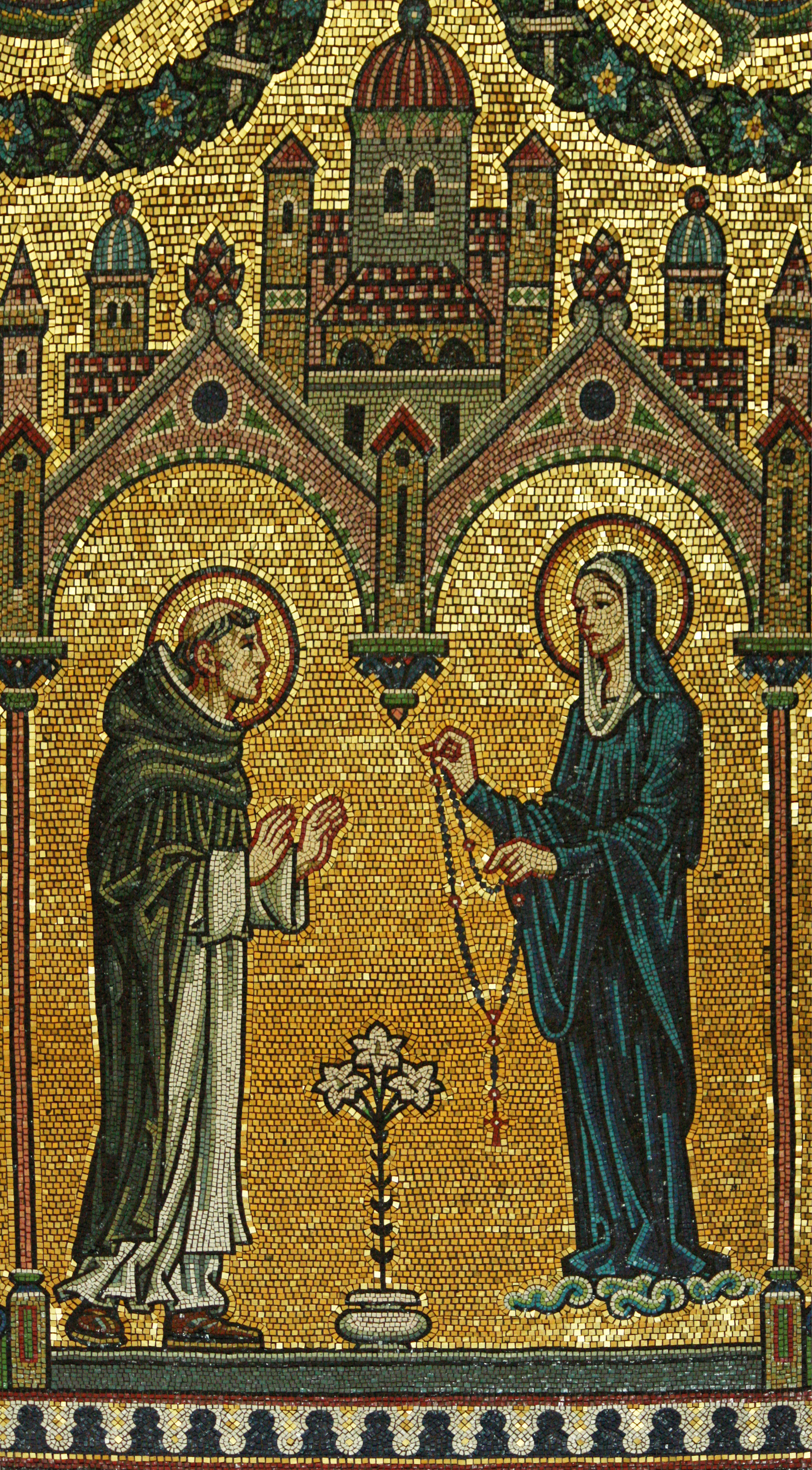
"Our Lady and St. Dominic", The Lady Chapel, Westminster Cathedral. The mosaics were designed by Gilbert Pownall and work started in 1930 under Basil Cary-Elwes.
It was in the year 1214 that the Church received the Rosary in its present form and very similar to the method we use today. It was given to the Church by St. Dominic, who had received it from the Blessed Virgin Mary as a means of converting the Albigensians and other sinners.
The Blessed Virgin Mary left for all Christians 15 promises to those who faithfully pray the Holy Rosary. Those promises were transmitted to Saint Dominic and Blessed Alan de La Roche. The 15 promises were compiled from their works:
- Whoever shall faithfully serve me by the recitation of the Rosary, shall receive signal graces.
- I promise my special protection and the greatest graces to all those who shall recite the Rosary.
- The Rosary shall be a powerful armor against hell, it will destroy vice, decrease sin, and defeat heresies.
- The Rosary will cause virtue and good works to flourish; it will obtain for souls the abundant mercy of God; it will withdraw the hearts of men from the love of the world and its vanities, and will lift them to the desire for eternal things. Oh, that souls would sanctify themselves by this means.
- The soul which recommends itself to me by the recitation of the Rosary, shall not perish.
- Whoever shall recite the Rosary devoutly, applying himself to the consideration of its sacred mysteries shall never be conquered by misfortune. God will not chastise him in His justice, he shall not perish by an unprovided death; if he be just he shall remain in the grace of God, and become worthy of eternal life.
- Whoever shall have a true devotion for the Rosary shall not die without the sacraments of the Church.
- Those who are faithful to recite the Rosary shall have during their life and at their death the light of God and the plenitude of His graces; at the moment of death they shall participate in the merits of the saints in paradise.
- I shall deliver from Purgatory those who have been devoted to the Rosary.
- The faithful children of the Rosary shall merit a high degree of glory in Heaven.
- You shall obtain all you ask of me by the recitation of the Rosary.
- All those who propagate the Holy Rosary shall be aided by me in their necessities.
- I have obtained from my Divine Son that all the advocates of the Rosary shall have for intercessors the entire celestial court during their life and at the hour of death.
- All who recite the Rosary are my sons and daughters, and brothers and sisters of my only Son Jesus Christ.
- Devotion of my Rosary is a great sign of predestination.
The Joyful, Sorrowful and Glorious Mysteries make the original Three Mysteries of the Holy Rosary. They are in connection with over 800 years of Tradition and in accordance with Our Lady’s revelations regarding her Rosary.
The traditional designated days for praying each Mystery are aligned with the natural order of the Mysteries: the Joyful, Sorrowful and Glorious Mysteries prayed on Mondays, Tuesdays and Wednesdays and again on Thursdays, Fridays and Saturdays. The particular Mystery prayed on Sundays varies according to the season of the Liturgical Calendar: the Sorrowful Mystery is prayed during Lent, the Joyful Mystery during Advent, and the Glorious Mystery on all the other Sundays of the year.
Saint Louis de Montfort wrote in his book The Secret of the Rosary,
"The Psalter or Rosary of Our Lady is divided into three chaplets of five decades each, for the following reasons:
- To honor the three persons of the Blessed Trinity;
- To honor the life, death and glory of Jesus Christ;
- To imitate the Church triumphant, to help the members of the Church militant, and to bring relief to the Church suffering;
- To imitate the three groups into which the Psalms are divided, the first being for the purgative life, the second for the illuminative life, and the third for the unitive life;
- To give us graces in abundance during life, peace at death, and glory in eternity.”


